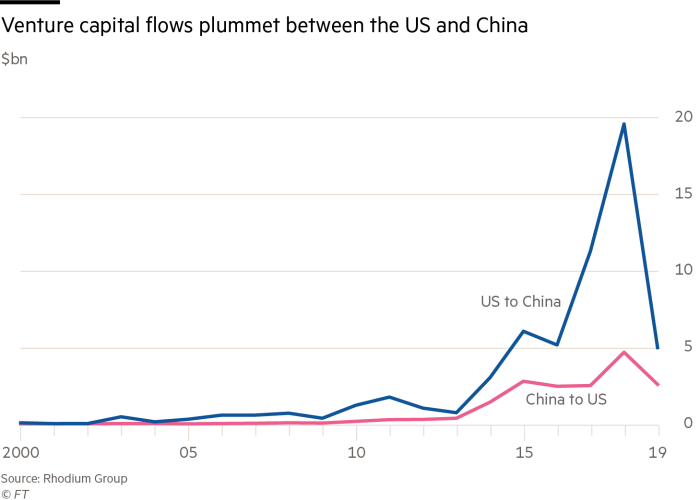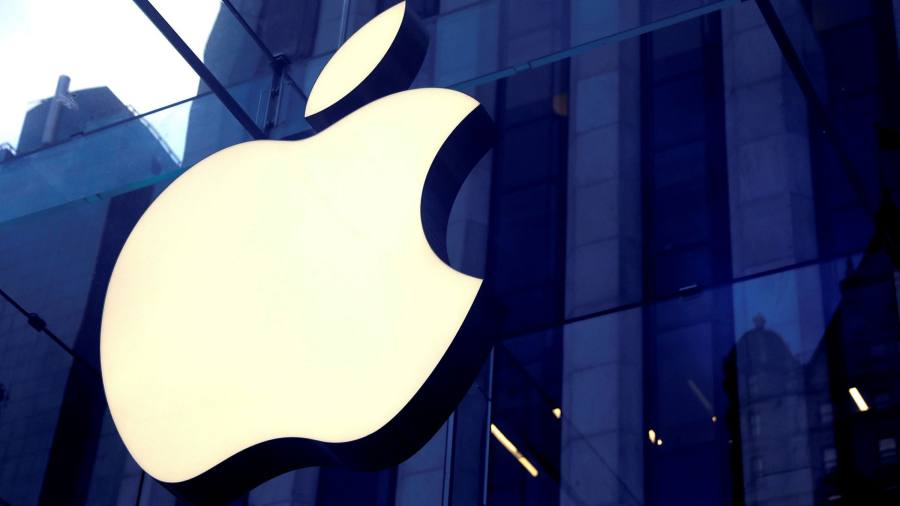Hi everyone, Mercedes here from Singapore bringing you the sixth Tech Scroll Asia newsletter under coronavirus lockdown. In a sign of the times, Singapore is trialling an intimidating robotic dog — called “Spot” — to patrol parks and enforce social distancing. For a video of the scary Spot at work check out Mercedes’ Top 10.
We lead this week with a story on how Apple is trying to deepen its supply chain in China, even as US-China decoupling goes into overdrive (see Smart Data). Elsewhere, India’s Reliance Jio is on a roll with new investors after its deal with Facebook and, finally, we take a look at how Hong Kong’s Li & Fung, the world’s largest sourcing company, is being squeezed by Amazon and Alibaba (In the Spotlight). Take care until next week.
The Big Story — exclusive
Apple is seeking to deepen its supply chain in China. At a time when the US is “decoupling” from China, Apple is encouraging one of its Chinese suppliers to make a big investment in a Taiwanese company that manufactures metal casings for iPhones and MacBooks, according to this exclusive in the Nikkei Asian Review.
Apple hopes the move would create a formidable alternative to Foxconn, a Taiwanese company that has long been Apple’s biggest supplier, making more than 50 per cent of iPhones since the device’s debut in 2007.
Key implications: The company that Apple is encouraging is called Luxshare-ICT, a fast-growing Chinese manufacturer that already assembles Apple Airpods. If it finalises long-running talks with Taiwan’s Catcher Technology, it would give Luxshare the ability to produce high-quality metal casings as well as access to smartphone assembly knowhow.
This would take Luxshare a step closer to becoming the Chinese version of Foxconn — a single company with operations that span nearly the entire electronics supply chain. It could also help Luxshare take on a bigger role as an Apple supplier.
Upshot: “For Apple, it is a win-win situation to support the growth of Luxshare,” a supply chain manager said of the proposed Catcher deal. “Not only do Chinese companies offer lower prices with competitive quality, but it would also help Apple further deepen its network in a market with 1.3bn people.”
Mercedes’ Top 10
-
In some ways the QR code system in China is awe inspiring. But it is also prone to glitches that can cut people off from society, as FT Beijing correspondent Don Weinland discovered.
-
Spotify received a boost in India this week thanks to a deal with Saregama, one of the world’s oldest labels. Both international and domestic companies are competing for dominance in what is one of the world’s biggest entertainment markets.
-
Once hailed as a visionary entrepreneur and one of China’s richest men, Jia Yueting’s fall from grace has been spectacular. He owes creditors billions. And Faraday Future, his US car company, is a mess. Can his latest crazy pitch keep him from ruin?
-
South-east Asia’s venture capitalists raised $3.6bn from investors in 2019, a 68 per cent increase from the year before. The number of venture funds rose from 19 to 34 over the same period. But such exuberance is now unravelling during coronavirus, as per this DealStreetAsia report. ($)
-
Is the bitcoin price about to spike? Supplies of the virtual currency were halved this week, a feature that occurs every four years. The previous two times bitcoin was halved, its price jumped.
-
“Slow is smooth, and smooth is fast.” The FT’s John Thornhill has another must-read on the global struggle to develop an effective contact tracing app at scale.
-
Here’s one for the smartphone enthusiasts. Apple sees its cheaper iPhone SE as crucial to regaining lost ground against lower cost Chinese rivals. Nikkei Asian Review has a teardown on the make-up of the phone and how the US company created the bargain.
-
Coronavirus has not dented China’s ambition of becoming the world’s 5G superpower. The country is on track to sign 70 per cent of 5G smartphone contracts by the end of the year, putting it far ahead of competitors.
-
Remarkably, Samsung has avoided meaningful production disruptions during coronavirus. The FT’s Seoul correspondent Edward White gives the inside run on how the South Korean group kept its supply chain running during the crisis.
-
Only in Singapore. The Asian city-state has implemented a robotic patrol dog designed by Boston Dynamics to encourage social distancing in parks. “Spot” seems effective mostly because the sight of him is so unnerving. For more on coronavirus’s boost to robotics, check out FT Tokyo correspondent Kana Inagaki’s column on automation in Japan.
When sages speak
-
This webinar from Brookings provides a top level investigation of China’s technological advances and the competitive challenge they pose to the US. It features Nicol Turner Lee discussing 5G telecoms, Sheena Chestnut Greitens talking about Chinese surveillance tech, Carrick Flynn on semiconductor manufacturing, Frank Rose delving into the space race and Aaron Klein on digital money.
-
Jennifer Bouey of the Rand Corporation presents an expert analysis of China’s healthcare system reform and global health strategy in this testimony to the US-China Economic and Security Review Commission. Much of it is concerned with Covid-19 and there is a section on biomedical and clinical research.
-
This podcast from the Council on Foreign Relations looks at the looming threat of digital authoritarianism in India. Chinmayi Arun, Vindu Goel and Seema Mody discuss recent moves by the Indian government to trace and censor WhatsApp, the Facebook messaging app that has around 400m users in India.
Heard by Henny
The world barely took note in mid-April when news broke that the People’s Bank of China was experimenting with a central bank digital currency to be rolled out by state-owned banks. In some ways, the news represents confirmation of how China has leapfrogged the developed world when it comes to electronic payments and financial technology, making its systems safer and more secure.
That development, in turn, has fed speculation — and hope — that the new mechanism can eventually be used to support consumer spending on the part of mainland households. Against the background of China’s globally modest Covid-19 stimulus, it is exactly this sort of targeted action that some argue is needed.
“The rationale for China to move into a digital currency is clear,” notes Christopher Wood, equity strategy for investment bank Jefferies in Hong Kong. “Apart from making use of a new cost saving and secure technology, it also represents a way for the central government to take back control over nominally private companies, such as Alibaba and Tencent, which have in effect controlled payment systems in recent years via the explosion of ecommerce in the mainland economy.”
Read the full story from Henny Sender, the FT’s international finance correspondent, here.
Art of the deal
-
Jio Platforms, India’s largest mobile telecoms provider, is winning more suitors after Facebook announced in April its $5.7bn investment in the company for a 9.9 per cent stake. Texas buyout firm Vista Equity Partners has taken a 2.3 per cent stake for $1.5bn while General Atlantic is considering a 2 per cent stake, according to unconfirmed reports.
-
Shares of China’s Kingsoft Cloud — featured in last week’s issue of Tech Scroll Asia — jumped more than 25 per cent on its US market debut, shrugging off the influence of the pandemic and tense US-China relations. The company raised $510m at $17 per share, valuing Kingsoft Cloud at $3.7bn.
-
About seven months after it raised Rmb1.5bn ($210m), Chinese cyber security company Qi An Xin Group has filed a prospectus with Shanghai’s Nasdaq-style STAR Market to prepare for an initial public offering to raise Rmb4.5bn.
-
Dingdong Maicai had a good pandemic. The Chinese start-up’s focus on delivering groceries to your doorstep made it a favourite during the lockdowns. It has now raised $300m in a new funding round that values it at $2bn, according to Reuters.
-
Intel Capital, the venture arm of US chipmaker Intel, has invested in two Chinese start-ups in the semiconductor sector. More here.
In the spotlight
For every tech disrupter, there are those who feel the pain of being disrupted. Spencer Fung, chief executive of Li & Fung — the world’s largest sourcing company — is in the latter category.
Ecommerce companies such as Amazon and Alibaba are squeezing the 114-year-old Hong Kong company by putting many of its customers — traditional retailers — out of business. The pandemic and US-China trade war have added to the stress.
After losing 95 per cent of its market value since 2011, Li & Fung decided this week to delist from the Hong Kong stock exchange. Now Harvard graduate Fung is seeking a digital makeover for his company.
Smart data

Decoupling certainly seems to be having an effect on venture capital flows. US venture capital investments into Chinese companies declined to an estimated $5bn last year, down sharply from $19.6bn in 2018 when American funds made several big bets on Chinese technology companies that were preparing to list their shares on the stock market.
Chinese venture capital investments into the US also ebbed last year, according to data from the Rhodium Group, a research firm. Signs are that in the first quarter of this year, such investments fell further.


